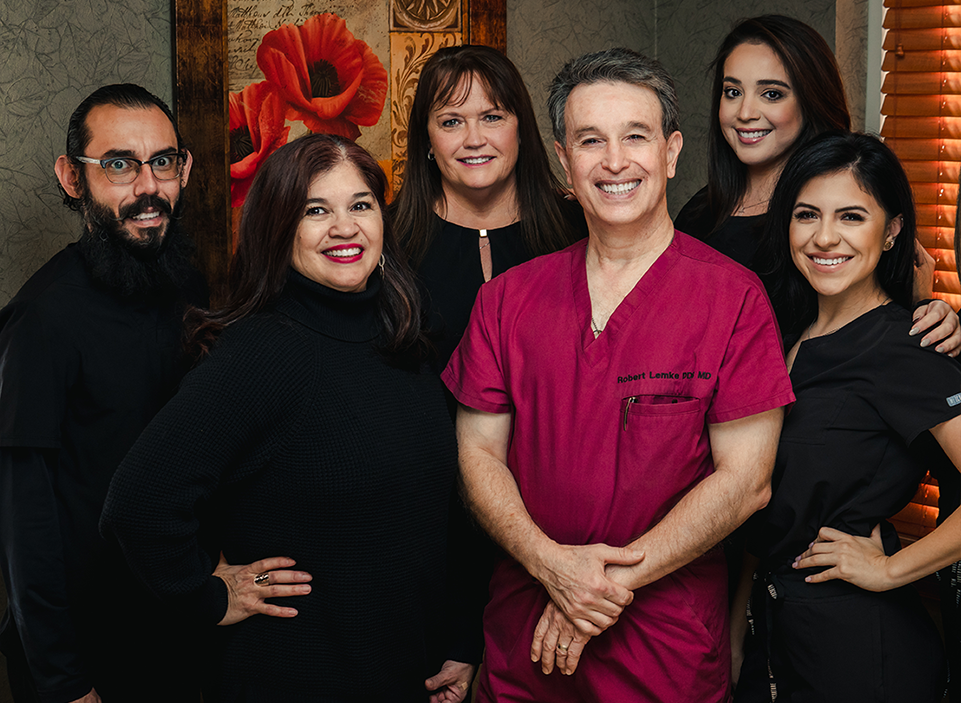Make An Appointment Today. We Will Give You A Reason To Smile.

Unlike simple snoring, obstructive sleep apnea (pauses in breathing) is a potentially life-threatening condition that requires medical attention. The risks of undiagnosed OSA include heart attack, stroke, irregular heartbeat, high blood pressure, heart disease and decreased libido. In addition, OSA causes daytime drowsiness that can result in accidents, lost productivity and interpersonal relationship problems. The symptoms may be mild, moderate or severe gasping, choking, restless sleep, problems with mental function, memory loss, morning headaches, frequent trips to the bathroom at night, and many other symptoms.
Sleep apnea is fairly common. One in 5 adults has at least mild sleep apnea and 1 in 15 adults has at least moderate sleep apnea. During sleep, the upper airway can be obstructed by excess tissue, large tonsils and/or a large tongue. Also contributing to the problem may be the airway muscles (which relax and collapse during sleep), nasal passages, and the position of the jaw.
We can assist you with instruction on behavioral modifications and practical interventions including weight loss, avoiding alcohol, caffeine and heavy meals within two hours of bedtime. For more advanced problems we recommend:
Oral Appliances – a molded device that is placed in the mouth at night to bring the lower jaw forward, which increases the size of the upper airway, thus reducing the air resistance that leads to sleep apnea and snoring. Although not as effective as the continuous positive airway pressure (C-PAP) systems, oral appliances are indicated for use in patients with mild to moderate OSA who prefer oral appliances, who do not respond to C-PAP, are not appropriate candidates for C-PAP, or who fail treatment attempts with C-PAP or behavioral changes. Patients using an oral appliance should have regular follow-up office visits to monitor compliance, to ensure the appliance is functioning correctly and to make sure their symptoms are not worsening.
Surgical intervention may be a viable alternative for some OSA patients. Every patient has a different shaped nose and throat, so before surgery is considered, we will measure the airway at several points and check for any abnormal flow of air from the nose to lungs.
Uvulopalatopharyngoplasty (UPPP) – If the airway collapses at the soft palate, a UPPP may be helpful. UPPP is usually performed on patients who are unable to tolerate the C-PAP. The UPPP procedure shortens and stiffens the soft palate by partially removing the uvula and reducing the edge of the soft palate.
Hyoid Suspension – If collapse occurs at the tongue base, a hyoid suspension may be indicated. The hyoid bone is a U-shaped bone in the neck located above the level of the thyroid cartilage (Adam’s apple) that has attachments to the muscles of the tongue as well as other muscles and soft tissues around the throat. The procedure secures the hyoid bone to the thyroid cartilage and helps to stabilize this region of the airway.
Genioglossus Advancement (GGA) – GGA was developed specifically to treat obstructive sleep apnea, and is designed to open the upper breathing passage. The procedure tightens the front tongue tendon; thereby, reducing the degree of tongue displacement into the throat. This operation is often performed in tandem with at least one other procedure such as the UPPP or hyoid suspension.
Maxillomandibular Advancement (MMA) – MMA is a procedure that surgically moves the upper and lower jaws forward. As the bones are surgically advanced, the soft tissues of the tongue and palate are also moved forward, again opening the upper airway. For some individuals, the MMA is the only technique that can create the necessary air passageway to resolve their OSA condition.
Fill out this brief form and we will get back to you shortly. Or call us today.

Fill out this brief form and we will get back to you shortly. Or call us today.

We are an oral and maxillofacial surgical practice devoted to restoring and enhancing the natural beauty of your face and smile using state-of-the-art surgical and non-surgical procedures that will result in beautiful, long lasting smiles!
11919 Culebra Rd., Bldg. 2 Suite 205
San Antonio, TX 78253
Phone: 210.695.5004
© Oral Surgery of Alamo Ranch 2024. All Rights Reserved.
Powered By Citywide SEO